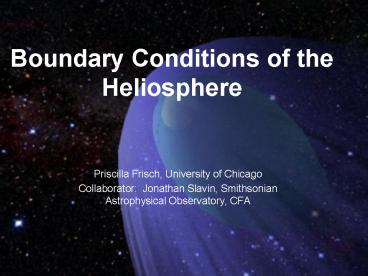Boundary Conditions of the Heliosphere
1 / 28
Title:
Boundary Conditions of the Heliosphere
Description:
Boundary Conditions of the Heliosphere. Priscilla Frisch, University of Chicago ... Void affects heliosphere boundary conditions. 5. RADIATIVE TRANSFER MODELS ... –
Number of Views:35
Avg rating:3.0/5.0
Title: Boundary Conditions of the Heliosphere
1
Boundary Conditions of the Heliosphere
- Priscilla Frisch, University of Chicago
- Collaborator Jonathan Slavin, Smithsonian
Astrophysical Observatory, CFA
2
Sun in decelerating interstellar flow from Loop I
10 pc Filling factors G, AG 40, 26
Log plot (AU)
Sun
?
G Cloud 29.3 km/s
LIC 26.2 km/s
36 Oph
LISM Bulk Flow 28.1 - 4.6 km/s Obs
Direction L,B 12.4o, 11.6o ????82.4o,
-11.6o
3
Heliosphere Boundary Conditions determined
by Galactic Neighborhood of Sun
GC
B
Dust Model of Spiral Arms from COBE Far infrared
240 mm
B MAGNETIC FIELD from Faraday Rotation
Drimmel 2004
4
Goal Predict Interstellar Boundary Conditions
of Heliosphere
Local Bubble Void affects heliosphere boundary
conditions
- Radiation field in LIC
- Loop I -gt cloud kinematics
Local ISM
- Cloud density
- ionization
5
RADIATIVE TRANSFER MODELS
- 4 input Variables to CLOUDY n(H), N(Ho), TLB, B
- Model interstellar radiation field at cloud
surface including EUV radiation from cloud
interface - Properties of boundary between LIC and adjacent
hot plasma - conductive interface regulated by
TLB, B (use Wisconson SXRB B-band and Be-band
data) - Set total n(H) and N(HI) cloud density
- Run radiative transfer models
- Select results that agree with Data
- Local Interstellar Cloud towards ? CMa
- Heo inside of heliosphere
- Partially neutral ISM forming pickup ions N, O,
Ne, Ar - Tweak radiation field, n, N(HI), until models
match data - Model C, N, O, Mg, Si, S, Fe abundances
constrained by C, No, Oo(??), Mg, Si, S, Fe
LIC data for ? CMa - Model Ne, Ar abundances fixed
6
Slavin Frisch (2007)
Radiative Transfer Models
Model 26
Model 42
7
? CMa (Gry Jenkins)
Pickup Ions (Gloeckler)
8
Matter Distribution at Sun from ABOVE
600 pc
Galactic Center
Interstellar Radiation Field
Galactic Center
9
Ultraviolet Radiation Hot Stars ? CMa, ? Cma
--gt LIC Ho Ionization
Hot Stars --gt Red H Balmer Emission (H?, WHAM)
X-rays
0o
270o
90o
Adhara B2II ? CMa
Hot Stars --gt 1565 A (TD-1 data)
10
Conductive Interface between Local Bubble Plasma
and Local Interstellar Cloud (Slavin 1989 Slavin
Frisch 2007)
Voutflow 10-35 km/s
11
Interstellar Radiation Field in LIC at Heliosphere
Ne
TD-1
e CMa
White Dwarf Stars
Slavin Frisch 2007
12
Cluster of Local Interstellar Clouds Low Opacity
t1 at 504 A
t1 at 912 A
13
Cluster of Local Interstellar Clouds Low Opacity
Ho/Heo Varies Continuously between Cloud Surface
and Sun
HII
Ho and Ca data
n(HI) 0.2 cm-3
14
LIC is low opacity ISM, gives ionized gas
N/No H/Ho by charge exchange
26
15
CLOUD IONIZATION
Electron Density in LIC
1) Ionization balance of Mg
2) Collisional ionization of C fine-structure
J3/2 and J1/2 lines
16
Electron Density in LIC
Sightline 2
17
Ionization Gradient across LICseen in H, He, N,
O, Ne (Ar)
18
Model Selection Criteria
- In situ He density and temperature
- - Cavaet Is He filtration lt 1?
- MgI/MgII (CII/CII) to star
- Cavaet MgII--gtMgI dielectronic recombination
strong function T - Pickup Ion data for Ar, Ne, N, O
- Interstellar Ar, Ne abundances poorly known
- N, O filtrations depend on Heliosphere model
IBEX will help
19
- n(Ho) 0.19-0.20 cm-3
- n(e-) 0.04-0.08 cm-3
- If pressure equibrium -gt B2.5 ?G
- VSun-LIC 26.3 km/s (Ulysses)
20
Slavin Frisch (2007)
Model 26
Model 42
21
LIC Only (Model 26) Constraints Results
Data PUI Gloeckler Geiss 2006, PUI Cummings
Stone 2002, HeI Moebius et al. 2005 Eps CMa Gry
and Jenkins 2002, Solar-Asplund et al 2007
22
Current epoch Interstellar Cloud Surrounding
Sunhas High Neutral Fraction which enters
Heliosphere
- n(Ho) 0.19-20 cm-3
- n(Heo) 0.015 cm-3
- n(e-) 0.04-0.08 cm-3
- (new MgII-gtMgI rates)
- Ulysses T 6,300340 K
- Hydrogen 22 ionized
- Helium 43 ionized
- Ionization gradient in LIC
Ne
Heo
He
Neo
Ne
LIC IONIZATION
(Slavin Frisch 2006)
23
RADIATIVE TRANSFER MODELS ILLUMINATE INTERSTELLAR
DUST
Slavin Frisch 2007
Ratio of Gas mass to Dust mass in LIC
24
Depletions Abundances Log(Agas) Log(Asun) ?
Depletion (?)
Cold ISM
Welty
Dust Grain Destruction in Shock
LIC
Need H
halo
warm
cold
Welty
25
Same Upwind Gas and Dust inflow
Cold ISM
LIC
halo
warm
cold
Frisch et al. 1999
26
Grain Destruction In Interstellar Shocks
Cold ISM
LIC
halo
warm
cold
Frisch et al. 1999
27
Summary Boundary Conditions of the Heliosphere
- n(Ho) 0.19-0.20 cm-3
- n(e-) 0.04-0.08 cm-3
- If pressure equibrium -gt B2.5 ?G
- VSun-LIC 26.3 km/s (Ulysses)
- Enhanced abundances of Fe, Ca, refractories
indicate grain destruction in shock. - LIC is normal gas for an expanding superbubble
shell - high abundances, warm, tenuous,
intermediate velocity gas.
28
The Local Bubble
0o
OB Associations De Zeeuw et al. 1999
CO Clouds Dame Thaddeus 1987
HII Region - Gum Nebula
Sun
Plasma T 106.1 K n 0.005 - 0.026 cm-3
Associations Form Tilted Plane
200 pc
180o
Ref Frisch, American Scientist (2000)































